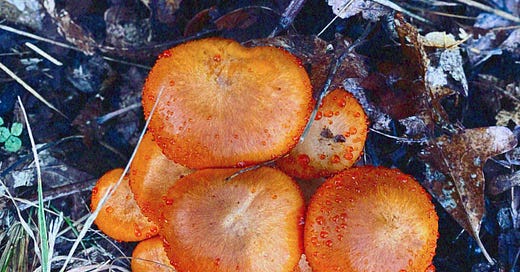The newsletter today is serving two purposes: 1) wrapping up Sex Month; 2) sharing an excerpt from my chapter in Make the Golf Course a Public Sex Forest. There are no lists today, but they will return next week along with regularly scheduled programming. Thank you for joining along during this month of sex-centric writing and interviews. <3
Dear ones,
As I wrap up Sex Month, I am reflecting on a few significant takeaways. First is that, unsurprisingly, most of my essays and interviews were centered on pleasure. I wrote about my own experiences with sexual violence, Pamela Anderson’s experiences with harm, and did some reflecting on awful headlines regarding trans kids (which shouldn’t be about sex, but because of the Christian Right, inexplicably, is), but mainly I talked about kink and desire and all the writers and troublemakers past and present who’ve inspired me to center the delights of sexuality in my writing and thinking and dreaming.
Another thing I noticed is that, alongside my little posts, the discourse about sex in radical politics right now is as contentious as ever. Or at least it is online, which I suppose is both real life and not real life, but worth engaging nonetheless. The extremely flattened version of the current conversation is this: Millennials and Gen Xers (especially queer ones) are frustrated with Gen Z for being “puriteens” who are against kink at pride, sex scenes in movies, having sex when children are in the house, etcetera. In their defense, youth liberationists are rightly chiming in to say that young people are reacting to norms around compulsory sexuality that have been harmful, and are fumbling their way through boundary setting. This is the nature of a Twitter debate: you put up two “opposing” sides and make them seem incompatible, people yell and quote tweet and dig their electronic heels in the timeline. Our cortisol raises and we are no safer from harm, no closer to pleasure.
The truth of the ‘debate’ is that it really ought not to be a debate at all. We need to take very seriously the reality of childhood sexual abuse (CSA), the nonconsensual sexualization of children, and the fact that we live in a culture that structurally ignores, or makes impossible, youth agency. To me though, all of this has very little to do with sex. As I talked about with Lyn and jimmy, sex gets thrown under the bus as The Thing That is The Problem, rather than the root of harm, which is: hierarchy in the form of the family, the church, the state; rape culture that I believe (from decades of feminist researching and organizing and sex working) is in part a product of shame culture, in which exploring sexual desires is either explicitly or implicitly punished; capitalism, that inspires the kind of poverty that makes leaving harmful situations sometimes impossible; white supremacy that teaches us to dehumanize and conquer for power (not pleasure; I will forever quote Friere to remind people that the oppressor is just as sucked dry of life as the oppressed). So of course radical queer perverts who are carrying on a legacy of survival through defiant sexual joy are a little cranky when “protecting the kids” becomes the foil of sex scenes, leather culture, or sex work.
We should, without question, keep kids safe and be in solidarity with them to keep themselves safe; this can be true while also staying steadfastly committed to rebutting narratives that suggest queers or other self-identified sex freaks are “violating boundaries” by, like, existing. I highly recommend everyone read these three brilliant essays—from Sophie Lewis, Max Fox, and Scott Branson— which tackle adjacent questions with a specific focus on the construct of the transgender child. Nothing makes more clear the dishonesty of the Right or the TERF/SWERF brand of reactionary feminism: they say to ‘save the kids’ as long as the kids aren’t queer or trans. I also think these essays help nuance some of the mostly good resurgence of youth liberationist discourse, finding a way to make distinct childhood sexuality from sexuality imposed on children.
The last thing I’ll mention in reflection on Sex Month, is that it was a mirror to my internalized whorephobia. By this I mean, there were times throughout the month (and before) when I felt ashamed. How gross of me to care about sex so much, what a joke to “reclaim” pervert you sicko, you are dirty in the worst way for engaging in sex work. And you’re shameless enough to write about it! (For anyone familiar, I identify these as my ‘Carrie reading the wedding announcement about Big and Natasha’ moments). Reader, these were real thoughts in my Feminist/Critical Sexuality Studies PhD, sex working activist, proud kinky queer brain. I shoo them away pretty easily, but it leaves me deeply sad for people who have no community or framework for exploring their desires without judgment. It also makes me scared. I think about incels; I think about the man who, in 2020, murdered Asian massage parlor workers blaming them for his so-called sex addiction; I think about the way shame and shadow can show up as harm when they aren’t allowed to be known.
I am wrapping up Sex Month sitting with the serious stakes—and also the silly hot playfulness—of power and desire. And with that, I am happy to share a short excerpt from my essay in Make the Golf Course a Public Sex Forest. It is filthy autotheory-erotica, so please proceed with caution. <3
love & solidarity,
raechel
–
Decision Making in Brainless Organisms
Keep reading with a 7-day free trial
Subscribe to radical love letters to keep reading this post and get 7 days of free access to the full post archives.




